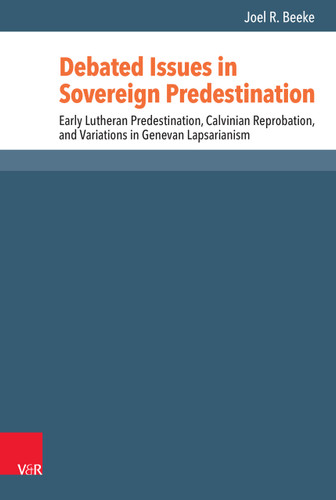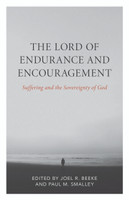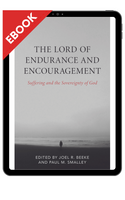Description
Joel R. Beeke examines three flashpoints of controversy in Reformation and Post-Reformation theology: first, the development of the Lutheran doctrine of predestination from Martin Luther and Philip Melancthon to the formula of Concord; second, the doctrine of reprobation as traced through the writings of John Calvin; and third, the doctrine of predestination in Geneva from Theodore Beza in the sixteenth century to Jean-Alphonse Turretin and Jacob Vernet in the eighteenth century. This book offers a balanced, historical analysis of a difficult subject.
Contents
Foreword by Donald Sinnema
Part I: Predestination in Early Lutheranism
Chapter 1: Historical Germination in Luther
Chapter 2: Further Germination in Melanchthon
Chapter 3: The Marbach-Zanchi Controversy
Chapter 4: The Doctrinal Position of the Formula of Concord
Chapter 5: Doctrinal Comparison of Concord and Dordt
Chapter 6: The Historical Reception and Doctrinal Reflections of Concordist Predestination
Part II: Reprobation in Calvin’s Theology
Chapter 7: The Study of Calvin’s Doctrine of Reprobation
Chapter 8: The Sources of Calvin’s Doctrine of Reprobation
Chapter 9: Embryonic Reprobation in the Young Theologian (1535–1538)
Chapter 10: Systematic Reprobation in the Strasbourg Theologian (1538–1541)
Chapter 11: Developed Reprobation in the Theologian Par Excellence (1542–1564)
Chapter 12: Conclusions and Implications of Calvinian Reprobation
Part III: Lapsarian Variations among Later Genevan Theologians
Chapter 13: Introduction to Post-Calvin Predestinarianism and the Lapsarian Question
Chapter 14: Theodore Beza’s Supralapsarianism and Infamous Tabula
Chapter 15: Predestination in Beza’s Other Writings
Chapter 16: From Beza’s Successors to Francis Turretin
Chapter 17: The Decline Under Francis Turretin’s Successors
Chapter 18: Conclusions on Sovereign Predestination
Endorsements
“Rather than presenting a complete history of the doctrine of predestination in early Protestantism, in this volume Joel Beeke tackles three controversial issues relating to predestination that have not been well addressed—the relationship between early Lutheran and Reformed views on predestination, Calvin’s view of reprobation, and how early Genevan theologians handled the supralapsarian-infralapsarian issue. Beeke addresses these difficult matters with sensitivity to historical context and development, systematic acuity, and a broad grasp of secondary scholarly literature with which he dialogues. The result is a balanced analysis of these issues that should bring greater clarity to scholarly understanding of predestination in the early modern era.”
— Donald Sinnema, Professor of Theology emeritus, Trinity Christian College, and author of “The Issue of Reprobation at the Synod of Dort” (PhD dissertation)
“This book highlights a fundamental but neglected field of research in Reformation and Post-reformation studies. With superb scholarship, lucid argument, and masterful historical perspective, Joel Beeke presents an indispensable contribution to the understanding of the doctrine of double predestination in the era of the Protestant Reformation. A historically informed and contemporary relevant study.”
— Adriaan C. Neele, Jonathan Edwards Center at Yale University, and Director of the PhD Program at Puritan Reformed Theological Seminary
“Joel Beeke is a prolific author of solid Reformed literature. In this book he demonstrates his ability to handle profoundly doctrinal themes such as double predestination, election and reprobation, and lapsarianism. Meticulously tracing the views of Luther, Melanchthon, Calvin and his successors on these perennially controversial subjects, he concludes that despite significant differences between Luther and Calvin on the place of reprobation in Scripture, both affirmed God’s sovereignty in choosing His elect and passing by the reprobate, although the Wittenberg reformer focused more on the grace of ‘the revealed God’ of the gospel than the ‘hidden God’ of reprobation. While both stressed that reprobates perish because of their sinful rejection of the gospel, Calvin maintained that man’s will is the proximate cause of his sin but that the ultimate cause of his damnation is the will of God.
“In their efforts (and those of their successors in their respective traditions) to avoid the charge of making God the author of sin, Beeke demonstrates how difficult it has been to resolve the apparent paradox. Both supra- and infralapsarians have formulated their opposing views on how God’s sovereignty relates to human responsibility. The record shows that neither approach removes all the difficulties. To take an imbalanced approach in either direction is fraught with danger, for it can easily result in passivism or synergism. Although supralapsarians have made valuable contributions to the debate, Dr. Beeke’s research indicates that most Reformed theologians have preferred the infra position. Though this book is written mainly for students of theology, it is accessible to anyone interested in the deeper things of God. Heartily recommended.”
— Cornelis (Neil) Pronk, emeritus pastor, Free Reformed Church, Brantford, Ontario
“As a pastor-scholar, Dr. Joel R. Beeke provides a wide-ranging, fast-paced survey of two centuries of continental predestinarian thought that focuses on three particularly debated issues: predestination in early Lutheranism, reprobation in Calvin’s theology, and lapsarian variations among later Genevan theologians. In doing so he not only conveys further light amid the scholarly confusion concerning the Reformed doctrine of predestination, but also shows why a clear view of predestination is so valuable for the church today.”
— David H. Kranendonk, Free Reformed minister in Oxford, Ontario and author of Teaching Predestination: Elnathan Parr and Pastoral Ministry in Early Stuart England
About the Author
Joel R. Beeke is president and professor of systematic theology and homiletics at Puritan Reformed Theological Seminary, a pastor of the Heritage Reformed Congregation in Grand Rapids, Michigan, editor of Banner of Sovereign Grace Truth, editorial director of Reformation Heritage Books, and a prolific author.






